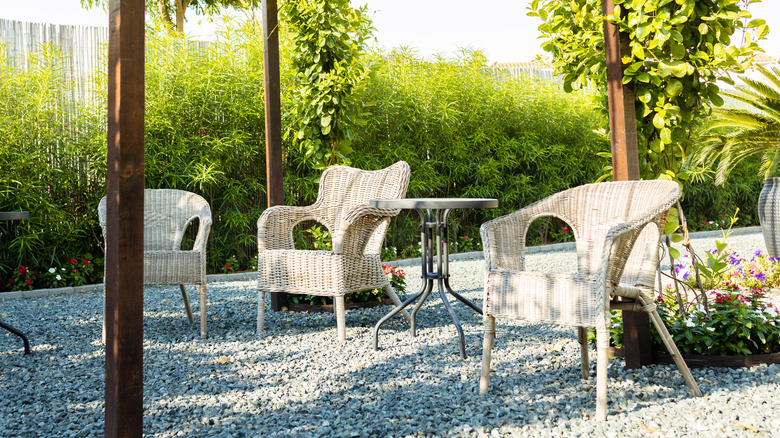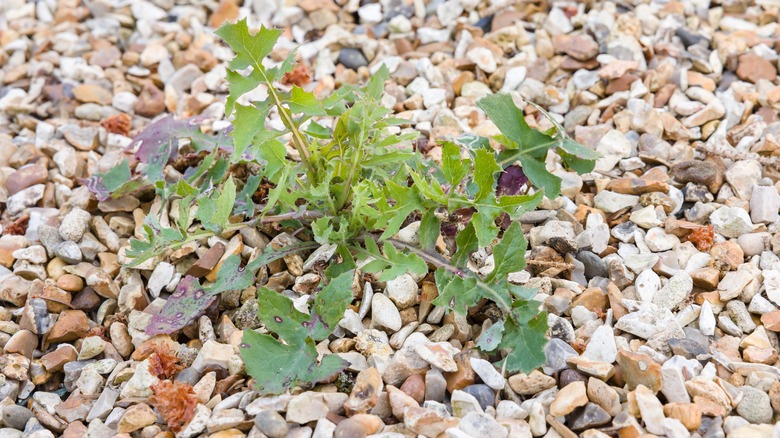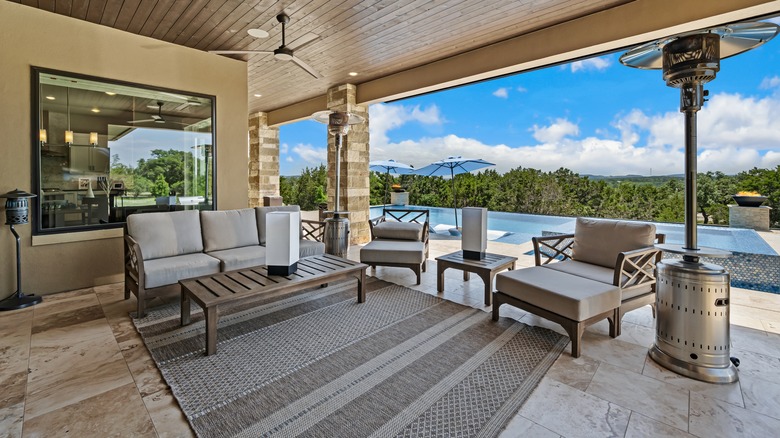Can A Gravel Patio Boost Your Home's Value? Here's What We Know
Savvy homeowners remain on a constant lookout for budget-friendly home upgrades to lift their abodes' decorative appeal and boost their value. While kitchen and bathroom renos form the crème-la-crème of such enhancements, upgrading your backyard space with a patio isn't without its perks. Gravel, the time-honored landscaping favorite and one of the most affordable materials to create a beautiful backyard patio, plays right into it. This especially holds true when you're emulating Mediterranean or cottage gardens with their dappled shade bistro tables. Besides, gravel patios are easy to create. Clear the area of weeds, level it, tamp down landscape fabric, and overlay it with a 2-inch thick layer of pea gravel or crushed stone. Et voila, your recreational space is up and ready, unless you want to rejig it further per your design preferences.
But do gravel patios truly deliver the biggest bang for their pebbles or are they a mere embellishment to appease your senses? To settle the debate, we got in touch with Ryan Fitzgerald, realtor and owner of Raleigh Realty – who also runs @raleighrealty on Instagram — for an exclusive interview. And according to him, the short of it is, "It depends." Your home's style as well as the preferences of buyers in your local market will both affect the increase in home equity. But even more importantly, Fitzgerald says, "The ROI of a gravel patio will never be the same as more expensive stone or paver patios, but it can still offer a modest increase in home value."
Gravel patios can raise home values, but not by much
Gravel patios are popular for a reason. "A well-designed gravel patio is quite versatile and generally more affordable than laying down brick or stone. This can be especially appealing to first-time buyers on a budget," elaborates Fitzgerald in his exclusive House Digest interview. He also touches upon their appeal amongst eco-friendly buyers looking for a casual outdoor space; or, for homeowners itching to improve their yard's drainage so they may directly grow plants into it, establishing a gorgeous xeriscape or a desert garden.
But there's a flip side, complicating matters. "When it comes to curb appeal, many buyers prefer the more polished look of poured concrete," Fitzgerald says. High-end customers may also have qualms about the quality and functionality of gravel patios: "Some buyers perceive gravel as low quality since it's not the most durable material for outdoor spaces, and can look quite messy if it's not maintained properly." Indeed, it isn't uncommon for weeds to find wiggle room in between the gaps or for the stones to wash out eventually, particularly when they haven't been laid down thickly. "An uneven gravel patio is also not the best for lounging, outdoor dining, or for families with young kids who like to play outside barefoot," our expert explains. Given such facts, it's no surprise that gravel patios don't deliver the highest returns. "You can probably expect a 1%-3% increase depending on the quality of the installation and how well it complements that home," confirms Fitzgerald.
Local market conditions underscore the utility of gravel patios
While the make and design of the gravel patio certainly affect the payoff homeowners fetch from this investment, it isn't the only determinant. As Fitzgerald states exclusively to House Digest, "What the local real estate market is doing is another big factor. For example, are you selling in an area that values eco-friendly building practices?" This becomes important because even though you've added more complementary square footage, buyers would be unwilling to account for it if it doesn't match their preferences.
Under such circumstances, how should you go about your decision to build a gravel patio? Fitzgerald offers a quick rule of thumb: "If you're looking for a low-maintenance, quick, and cost-effective improvement, a gravel patio is a good option. But if you want better ROI, you should consider more premium materials like flagstone or stamped concrete (especially in more competitive markets)." The reason he feels these work better is because they render the backyard patio a more polished appearance along with higher durability — key things that high-end buyers value in such spaces.


